Meet Ben: he's 18 and grew up in Cumbria. Find out about his job as a trainee electrical engineer at GlaxoSmithKline (GSK). Part of our Bitesize world of work series.
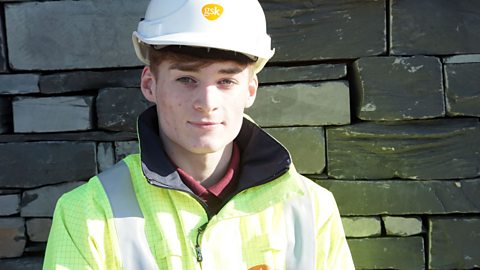
Never, ever give up!
How would you describe your job?
I am an Electrical Instrumentation Apprentice at GSK Ulverston. My job involves designing, maintaining and improving manufacturing facilities that are used in the pharmaceutical industry.
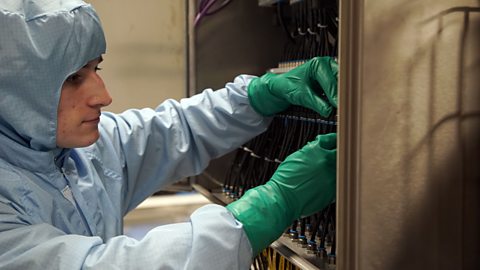
What does your apprenticeship involve?
In the first year I was in college full time studying for my Level 3 NVQ Extended Diploma in Engineering Maintenance.
In my second year I was on a rotation plan where I worked four days per week on site and had one day off to study for my Level 3 Diploma in Operations and Maintenance Engineering.
I'm in my third year now and am on a full-time rotation plan at GSK, with 12 week-long blocks off to study for a Higher National Certificate in Electronic and Electrical Engineering.
In my fourth year I'll finish the rotation plan and choose a specialism, at the end of which I will take my National Examination Board in Occupational Safety and Health Course.

How did you get into your job?
I've always been interested in understanding the mechanical workings of a product. My grandad used to work at GSK Ulverston too, so my interest in the pharmaceutical industry came from discussions with him.
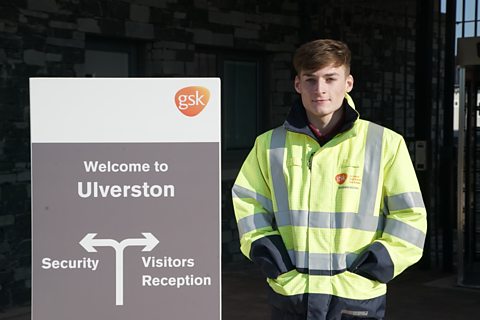
What was your educational career path?
I knew I wanted to be an electrical engineer so I researched which qualifications I needed to get on to a GSK apprenticeship and chose Mathematics, Physics and Resistant Materials at GCSE. I also did a work experience week at GSK Ulverston in Year 10.
During my GCSEs I applied for an apprenticeship at GSK Ulverston. This involved a short online form, an online assessment and then a full application form in which I needed to demonstrate my skills. I then had an assessment day, a formal interview and, finally, was accepted onto the course. I started my apprenticeship after my GCSEs.

What skills do you use in your work?
I use mathematical and statistical skills in my job. I also use the scientific methods I learnt in Physics, particularly when doing calculations or dealing with electrics.
I also use lot of soft skills too, such as leadership, teamwork, communication and problem-solving – I've greatly improved in these areas since starting my apprenticeship. A good work ethic is also really important because you need to complete college assignments as well as attend work every day. Because I work on rotation, I also need adaptability and flexibility as I've worked with lots of different teams and in different departments.
I use technical skills as well, such as how to use hand tools properly and safely.

Top tips
Research what options are available to you. You can gain lots of qualifications through apprenticeships, as well as learn on the job and get paid. You need to find out what's best for you
It's good to have a back-up option. I also applied for sixth form, as well as for my apprenticeship, just in case I didn't get through
If you can, do a work placement. My work experience really helped me to get on to my apprenticeship.

What to expect if you want to be an engineer
- How many people work in the engineering sector?
- What can you earn in different roles?
- What routes can you take to get in?
- Is the demand for engineers expected to grow in the future?
Watch the film to find out the answers to these questions, and much more!
Other resources
- See what type of engineering role might suit you with the
- Find out more about the different areas of engineering with this
- Learn more about roles in engineering with the
- Discover a practical new way to study via .
For careers advice in all parts of the UK visit: , , and .

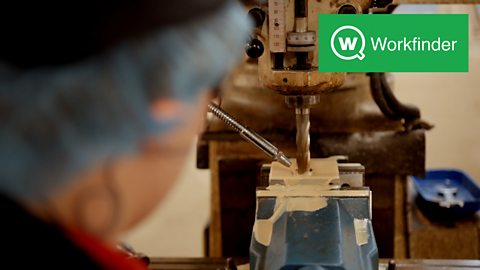
Find work experience placements with Workfinder.
Tips and advice
Help with interviews, writing a CV and all things work experience related.


How to become an engineer. collection
Find out more about the engineering sector and how those currently working in it got their foot in the door.
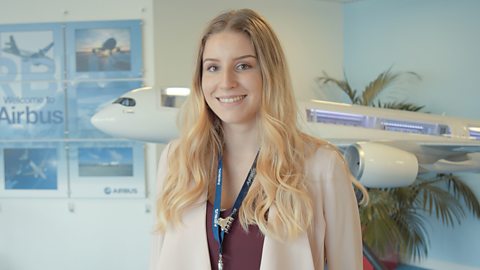
Zoe: apprentice site engineer. video
Zoe's helping to build a London tube station.

Aine: junior simulation engineer
Aine works to make buildings more energy efficient.
